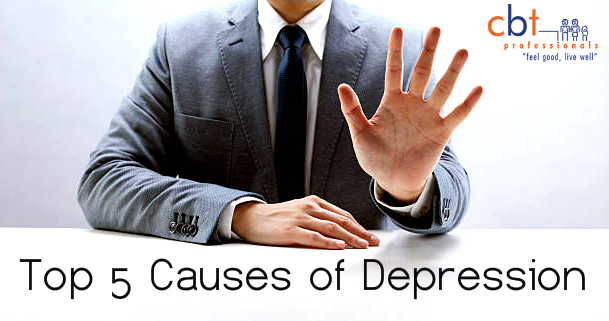Top 5 Causes of Depression
“Life is difficult” M. Scott Peck wrote in his book The path road travelled (1998). How true that is. Life is full of unwanted changes, losses and setbacks. And inevitably, some of these events can lead to depression and can affect any of us. Depression is one of the most common presenting issues at our clinic.
Depression can be caused by a combination of different factors or stressful life events (both past and present), but sometimes the cause is not so obvious. However, different stressors can affect individuals differently at different times of their lives.
Some factors that can increase the risk of developing depression include (but not limited to):
- Family history
You may have a higher riskof depression if itruns in your family. However, this does not mean you will develop depression just because a loved one has depression. Other factors can increase or decrease a person’s risk.
- Neurochemistry
Changes in your brain chemistry (neurotransmitters – serotonin, dopamine and noradrenaline) can play a role in depression although it is not fully understood. This is the chicken and egg story – do our brain chemicals change due to depression or does depression change our brain chemistry?
- Gender
More females suffer from depression than men. It could be due to hormonal changes such aspuberty and menopause, unhappy relationships (and caring for children), and the tendency to internalise their problems. However, women tend to seek social support, which can also act as a buffer.
- Personality
There is a connection between what happened (life stressors) and how we feel or make sense of what happened. People with negative thinking styles tend to be self-critical, worry a lot, dwell on negative events, have low self-esteem and may be more at risk of developing depression.
- Social factors and life events
Adverse childhood experiences – Some people who experience neglect or abuse during childhood may be more prone to developing depression as adults.
Trauma – individuals with posttraumatic stress can be at risk of depression
Life Stress – an accumulation of negative life events can bring on depression. For example: unemployment, financialdifficulties, long term work stress, relationship breakdown, relational issues with family members and children, loneliness, or death of a loved one.Recent stressors can also trigger a depressed mood if you are already vulnerable from previous bad experiences or personal factors. If your stress bucket is already full, it doesn’t take a lot for it to overflow.
Serious and long term physical health – the stress and worry of coping with a serious illness can lead to depression, especially if you’re dealing with long-term illness and/or chronic pain.
Drug and alcohol use – substance misuse is common in depression, either contributing to, or resulting from depression. It can also interfere with your medication.
Just because you are exposed to these factors, it does not mean that you will be depressed. Be mindful there are also factors that protect you against developing depression. The good news is there are many self-help strategies to improve your mood and a number of great psychological therapies that can treat depression. If you have concerns, please seek professional help with a mental health professional such as a psychologist. Speak to your GP about a referral.
THREE CONVENIENT LOCATIONS
MOUNT GRAVATT
Mt Gravatt Medical PrecinctSE 105, 1808 Logan Rd
Upper Mount Gravatt QLD 4122


